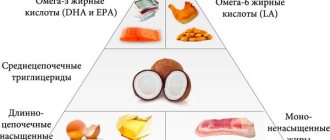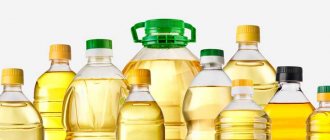Unsaturated fatty acids: Omega 3
Back in the 70s of the last century, Danish scientists became interested in the health of the Eskimos who lived on the shores of Greenland - they, unlike a good half of humanity, did not have any problems with the cardiovascular system. After conducting a series of studies, scientists found that the content of bad cholesterol in the blood of Eskimos was an order of magnitude lower than that of other populations, and this despite the fact that they consumed the same amount of fatty foods!
A few years later, another newspaper published a more detailed study in which scientists took a closer look at the diet of Eskimos and found that they consumed a certain type of fat from oily fish much more and more often than is typical in other diets - this is how scientists learned about polyunsaturated fats. acids, about long chains of EPA (eicosapentaenoic acid) and DHA (eicosapentaenoic acid) and DHA (docosahexaenoic acid) and that Omega-3 is not synthesized by the human body, and therefore must come from outside.
You may be interested in: Everything you wanted to know about GLUTEN
In the eighties and nineties, scientists conducted studies on rats, depriving them of important macronutrients - in particular Omega-3. During the study, rats deprived of adequate nutrition were more likely to get sick and suffer from diseases. Epidemiological studies in the field of cardiology supported the theory of the effectiveness of the use of polyunsaturated fatty acids for the prevention and treatment of cardiovascular diseases, and at the beginning of the 21st century, scientists proved that taking Omega-3 helps treat some mental illnesses, such as depression and slows down degenerative processes in time of dementia, in particular in Alzheimer's and Parkinson's diseases.
Omega-3 vs Omega-6
Most people consume much more Omega-6 than Omega-3. For full health, the balance of omega acids in our body should be 1:1. But due to the fact that Omega-6 is found much more often in food than Omega-3, and with the increased consumption of vegetable oils by people, the ratio has shifted in favor of Omega-6, sometimes reaching 50:1.
Omega-6s provoke inflammatory reactions in our body, which can lead to very serious consequences: cardiovascular diseases, arthritis, cancer, Crohn's disease, Alzheimer's disease, diabetes, etc. In addition, excessive consumption of Omega-6 blocks the synthesis of EPA and DHA from ALA. This is another reason to avoid vegetable oils in favor of butter, coconut and olive oils.
Omega-3 in the diet: benefits and benefits
Omega-3 takes an active part in the functioning of the human body, affecting the functioning of the heart, brain, internal organs and nervous system. Let's take a closer look at why taking Omega-3 is so important:
- Omega-3 and the circulatory system
A diet rich in Omega-3 fats can reduce the risk of many heart and vascular diseases. Taking Omega-3 helps increase cholesterol levels in the blood and reduces the level of “bad” cholesterol, preventing the development of atherosclerosis or thrombosis. Taking enough Omega-3 can reduce the risk of developing coronary heart disease and arrhythmia.
- Omega-3 and brain function
Fatty acids, in particular docosahexaenoic acid (DHA), are essential for the proper functioning of the cerebral cortex, they improve blood flow and also support the flow of nerve impulses between gray and white matter. Omega-3 is responsible for the proper functioning of the entertainment and coordination centers, and also has a positive effect on memory.
- Omega-3 and the immune system
Taking Omega-3 fatty acids has a positive effect on human immunity. These compounds stimulate the activity of white blood cells, which protect the body from bacteria and viruses. In this context, consuming sufficient amounts of Omega-3 is especially beneficial for pregnant women and young children, whose immune systems are just beginning to develop.
- Omega-3 and weight loss
Replacing animal and trans fats with unsaturated fatty acids has a positive effect on the process of losing weight. Omega-3 unsaturated fats do not accumulate in fat cells, have lower cholesterol levels, and also affect the regulation of insulin levels in the blood.
Products rich in Omega-3:
- fatty sea and river fish: salmon, tuna, herring, sea bass;
- fish oil: cod liver;
- crustaceans: lobster, crab, lobster;
- Cold-pressed vegetable oils: sesame, hemp, soybean, sunflower, walnuts, rice bran, rapeseed, corn;
- nuts: walnuts, brazil, almonds;
- seeds: flax, chia, pumpkin;
- green vegetables: broccoli, cabbage, green peas, soybeans, lentils;
- avocado.
World's Healthiest Foods Ranking of Foods Sources of Omega-3 Fatty Acids
| Product | Serving Size | Calories | Quantity (g) | DN (%) | Saturation | WHF rating |
| Ground flax seeds | 2 tbsp. l. | 74.8 | 3.19 | 132.9 | 32.0 | Great |
| Walnuts | 0.25 cups | 163.5 | 2.27 | 94.6 | 10.4 | Great |
| Salmon | 100 g | 244.9 | 1.47 | 61.2 | 4.5 | Very good |
| Sardines | 85 g | 188.7 | 1.34 | 55.8 | 5.3 | Very good |
| Beef, eco | 100 g | 175.0 | 1.10 | 45.8 | 4.7 | Very good |
| Carnation | 2 tsp. | 13.6 | 0.18 | 7.5 | 9.9 | Very good |
| Soya beans | 1 cup boiled | 297.6 | 1.03 | 42.9 | 2.6 | Fine |
| Halibut | 100 g | 158.8 | 0.62 | 25.8 | 2.9 | Fine |
| Scallops | 100 g | 127.0 | 0.41 | 17.1 | 2.4 | Fine |
| Shrimps | 100 g | 112.3 | 0.37 | 15.4 | 2.5 | Fine |
| Tofu | 100 g | 86.2 | 0.36 | 15.0 | 3.1 | Fine |
| Tuna | 100 g | 157.6 | 0.33 | 13.8 | 1.6 | Fine |
| Cod | 100 g | 119.1 | 0.32 | 13.3 | 2.0 | Fine |
| winter pumpkin | 1 cup baked | 75.8 | 0.19 | 7.9 | 1.9 | Fine |
| Leafy greens | 1 cup ready | 49.4 | 0.18 | 7.5 | 2.7 | Fine |
| Spinach | 1 cup ready | 41.4 | 0.17 | 7.1 | 3.1 | Fine |
| Raspberries | 1 cup | 64.0 | 0.15 | 6.2 | 1.8 | Fine |
| Cabbage | 1 cup ready | 36.4 | 0.13 | 5.4 | 2.7 | Fine |
| Mustard seeds | 2 tsp. | 20.3 | 0.11 | 4.6 | 4.1 | Fine |
| Romaine lettuce | 2 cups | 16.0 | 0.11 | 4.6 | 5.2 | Fine |
| Turnip | 1 cup ready | 28.8 | 0.09 | 3.8 | 2.3 | Fine |
| Strawberry | 1 cup | 46.1 | 0.09 | 3.8 | 1.5 | Fine |
| Brussels sprouts | 1 cup raw | 37.8 | 0.09 | 3.8 | 1.8 | Fine |
| Miso | 1 tbsp. | 34.2 | 0.08 | 3.3 | 1.8 | Fine |
| Green beans | 1 cup raw | 31.0 | 0.07 | 2.9 | 1.7 | Fine |
| Pumpkin | 1 cup raw | 18.1 | 0.06 | 2.5 | 2.5 | Fine |
Omega-3 in vitamins and dietary supplements
Today, on the modern market, there are a large number of drugs and supplements that contain Omega-3 and which can complement your diet. The healthiest supplements are those based on natural substances such as fish oil. When choosing a drug:
- pay special attention to the date of manufacture,
- carefully read the composition of the drug,
- avoid buying a large number of capsules,
- take into account the content of DHA and EPA fatty acids - they are considered the most beneficial for the human body.
Doctors also recommend focusing, first of all, on consuming foods rich in Omega-3 and Omega-6 and only then adjusting your diet with the help of dietary supplements, vitamins and minerals.
Top Thirteen Sources of Omega-3 Fatty Acids
Fish fat
Fish oil is perhaps the most important source of omega-3 fatty acids. It is a well-known dietary supplement and can be found in liquid form or capsules.
Salmon
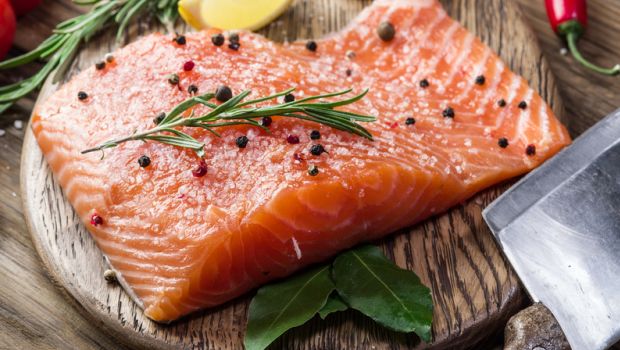
- There are two important types of omega-3 fatty acids, eicosapentaenoic acid (EPA) and docosahexaenoic acid (DHA). Both of these acids are found in fish.
- Salmon is also a source of dietary fats other than omega-3s.
- Farmed salmon contains about 1.8 grams of omega-3 per 85 grams, which is more than wild salmon.
- However, not all of this amount is usable by the body, and farmed salmon also contains pesticides and antibiotics.
- Thus, it is preferable to consume wild caught fish, which does not contain chemicals.
Other types of fish
In addition to salmon, there are many other fish rich in omega-3 acids. These include bluefish, tuna, herring, shrimp, mackerel, trout, anchovies, sardines, etc. It is recommended to eat fish two or three times a week.
Below are some popular types of fish and shellfish and their approximate omega-3 content per 100-gram serving:
- Salmon (Atlantic, Chinook, Coho): 1,200-2,400 mg
- Anchovies: 2,300-2,400 mg
- Bluefin tuna: 1700 mg
- Yellow tuna: 150-350 mg
- Canned tuna: 150-300 mg
- Sardines: 1,100-1,600 mg.
- Trout: 1000-1100 mg.
- Crab: 200-550 mg.
- Cod: 200 mg
- Scallops: 200 mg.
- Lobster: 200 mg.
- Tilapia: 150 mg.
- Shrimp: 100 mg
Other fats
In addition to fish oil, there are other fats that are excellent sources of omega-3 fatty acids. These are olive, rapeseed, soybean oils, and flax seed oil.
Olive and canola oil can easily supplement your diet if you add it to vegetables such as broccoli, asparagus, carrots, onions or potatoes, or if you fry them in them, it will make your diet healthier.
Flax seeds
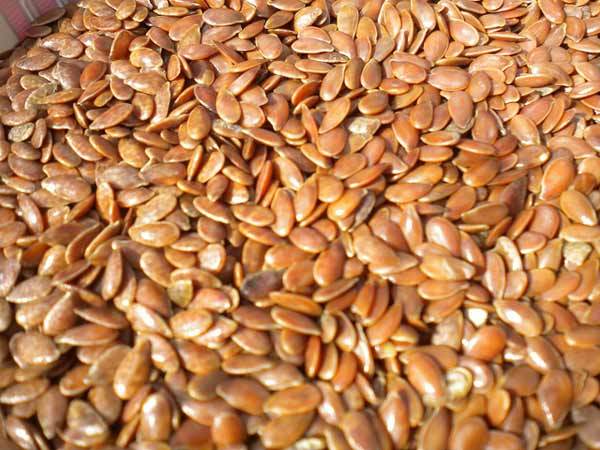
Like flaxseed oil, flax seeds are an excellent source of omega-3 fatty acids. These seeds are usually reddish brown or golden in color.
- To obtain the necessary nutrients, the seeds should be ground, since the outer shell is very difficult to digest.
- Flax seeds can easily be found in the health food section of any supermarket.
- It is better to grind the seeds and make the oil yourself, rather than buying ready-made oil in the supermarket, as it will quickly turn bitter, even if you keep it in the freezer.
- One of the great benefits of flaxseed is that it can be easily added to smoothies or oatmeal.
Try adding two tablespoons of flax seeds to your oatmeal or frozen berries to your protein shake. Here are some plant sources and the amount of omega-3 acids they contain.
- Flaxseed oil, 1 tablespoon. . . . .8.5 g ALA
- Walnuts, 30 g. . . . . . .2.6 g ALA
- Flax seeds, 1 tablespoon. . . . .2.2 g ALA
- Rapeseed oil, 1 tablespoon. . . . .1.2 g ALA
Eggs
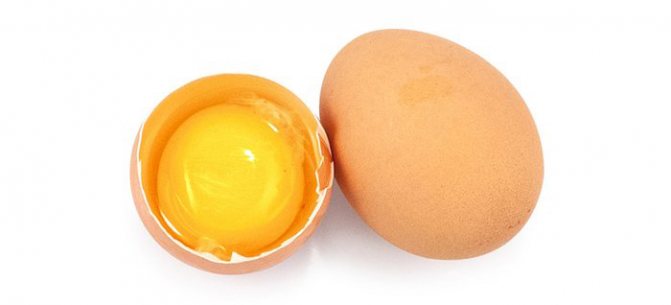
For those who don't really like fish, you can switch to eggs, as they are also a rich source of omega-3 fatty acids.
- To get enough fatty acids, consume organic beef or poultry, they are best.
- However, finding such meat can be difficult and, moreover, expensive.
- Therefore, eggs from grass-fed farm chickens are suitable as a replacement; they have 7 times more omega-3 than regular eggs.
- These eggs can be found in certain grocery store chains.
Chia seeds
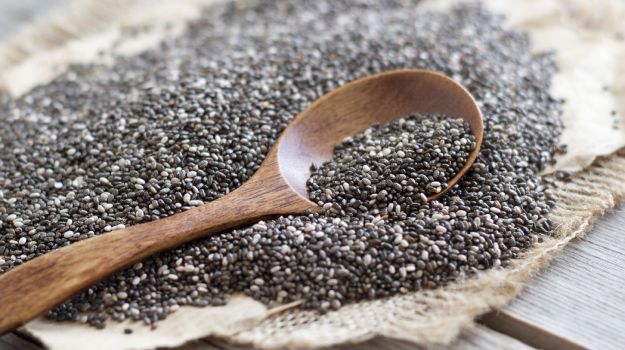
These seeds were a major source of energy for the Aztecs for hundreds of years, taste similar to nuts and are another excellent source of alpha-linolenic acid.
- These tiny seeds are rich in fiber, protein, calcium, magnesium and phosphorus.
- They can also be a substitute for whole grains. (But not Spanish culture, AAZAZAZAZA - approx. transl.)
- Unlike other seeds, they do not need to be ground for the body to absorb nutrients.
- Chia seeds can be added to yogurt, cereal or salads.
- These seeds can also be used to add variety to shakes, smoothies and snacks, thereby increasing their nutritional value.
- One or two teaspoons of chia per day will be very beneficial for your health.
Hemp seeds
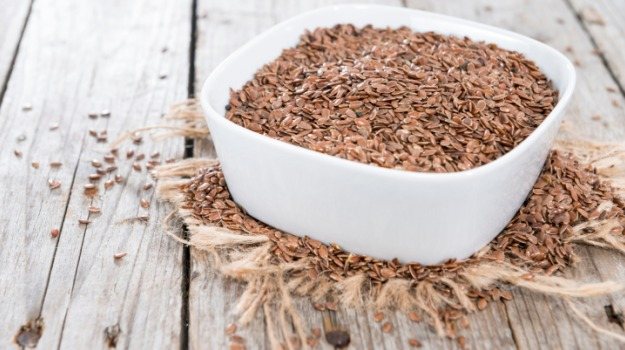
Of all the nuts or grains, hemp seeds contain the most essential fatty acids. They are high in protein, minerals and polyunsaturated fatty acids such as gamma-linolenic acid (GLA) and stearidonic acid (SDA).
They can also be sprinkled on various dishes; it is better to store the seeds in the freezer so that they do not spoil. (In fact, if you think about it, what the little ones do is a terrible transfer - approx. transl.)
Cauliflower
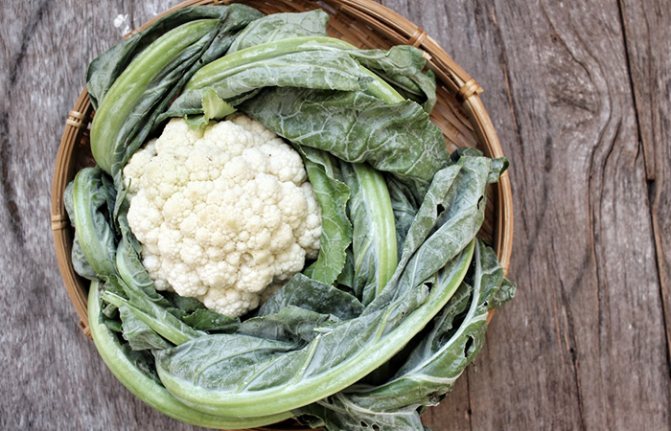
Cauliflower also contains quite a lot of omega-3 fatty acids, making this vegetable beneficial for maintaining heart health. In addition to omega-3, it is rich in nutrients such as potassium, magnesium and niacin.
In order for all the beneficial properties to be preserved, the cauliflower should be steamed for no more than five to six minutes, and lemon juice or cold-pressed olive oil should be added.
Brussels sprouts
These small green vegetables are actually a storehouse of beneficial substances, including omega-3 fatty acids, and are considered an ideal way to maintain healthy and beautiful skin. You also need to steam it for about five minutes.
Each serving of Brussels sprouts contains about 430 milligrams of alpha-linolenic acid.
Purslane
This nature-inspired salad contains about 400 milligrams of omega-3s per serving. It is also rich in calcium, potassium, iron and vitamin A. This makes it an important figure on the list of omega-3 rich foods.
Perilla oil

This oil is obtained from the seeds of the perilla plant and is an excellent source of omega-3.
More than 50 percent of perilla oil contains alpha-linolenic acid, with about 8,960 milligrams of omega-3s per teaspoon. (Who knows what I bought it for, that’s why I’m selling it - approx. transl.)
Now that you know the benefits of omega-3 rich foods and what they are, we are sure you will try to include them in your diet. Eat healthy, live a healthy lifestyle and let us know if you use the above.
Soybeans (roasted)
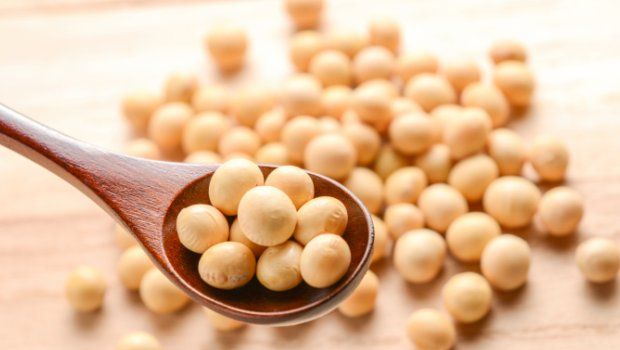
Few people know that this plant is very rich in omega-3 fats. Soybeans contain alpha-linolenic acid, which promotes heart health. In fact, a cup of steamed soybeans has more omega-3 fats than some fish!
Walnuts
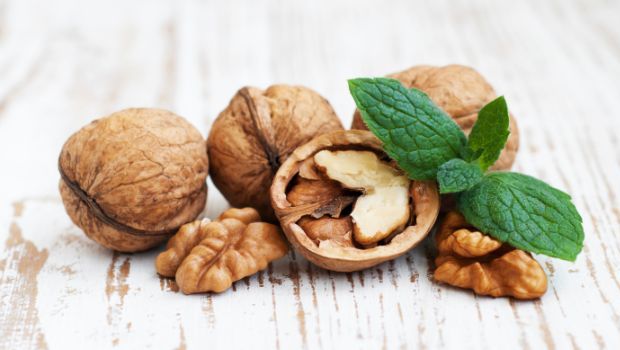
Add walnuts to your favorite baked goods, crumble and sprinkle on salad or cereal, or eat plain, walnuts are good in any form. This nut is not only good for blood vessels, but also helps maintain the desired weight.
Indications and contraindications for the use of Omega-3
How to take Omega-3? Due to its general positive effect on the human body, proven in various clinical studies, including those conducted by the European Food Safety Authority, the Department of Agriculture and the US Department of Health. and in a nutritional study supported by the World Health Organization, Omega-3 was included in general dietary recommendations, according to which:
- Adults are recommended to consume 250 mg/day - EPA/DHA, which is equivalent to two servings of oily fish per week .
- during pregnancy or breastfeeding - about 250 mg EPA + DHA / day + an additional 100-200 mg DHA.
- increasing the dose to 500 mg/day - EPA/DHA is recommended for adults for the prevention of cardiovascular diseases and up to 1000 mg/day for the treatment of cardiovascular diseases.
Are Saturated Fats Good or Bad?
Saturated fats, oddly enough, are on the “good” list.
The fact is that recent research has shaken old beliefs that saturated fat is responsible for cardiovascular disease and obesity.
It all started in 2010 with a large-scale study conducted by the American Journal of Clinical Nutrition. It failed to find any significant evidence that consuming these fats is associated with an increased risk of heart and vascular disease.
A 2014 study from the Annals of Internal Medicine confirmed these findings, finding no link between limiting saturated fat intake and improved cardiovascular health.
In 2015, the British Journal of Medicine published the largest study to date, concluding that saturated fat is not associated with poorer heart health.
Further research has even shown that the opposite is true - they may even be able to improve it.
For example, coconut oil, which is 84% saturated fat, has been shown to have health benefits by increasing good cholesterol and even possibly lowering bad cholesterol.
These studies suggest that not all saturated fats are blood vessel killers, and eliminating them from the diet over forty years may have even accelerated the rise in heart disease and obesity.
In addition, low saturated fat intake has been shown to increase the risk of hemorrhagic stroke.
Sources of saturated fat:
- Dairy
- Meat, poultry
- Butter
- Coconut oil
- Palm oil
- Cacao butter
Naturally, not all saturated fats are healthy, and even healthy ones should be consumed in moderation.
conclusions
To summarize, we can conclude that Omega-3 unsaturated fatty acids:
- improve brain activity;
- affect mental health and nervous system;
- have an antithrombotic effect
- have an anti-inflammatory effect
- stimulate the immune system.
Omega-3 is involved in many processes in the human body, so proper and balanced nutrition is an important element of good health and longevity. Whether or not you take additional Omega-3 is up to you, but we still recommend getting fatty acids naturally, from food, by adding fresh fish, high-quality oils, nuts, seeds and avocados to your diet.
What is the problem with Alpha Linolenic Acid?
Yes, our body is capable of synthesizing EPA and DHA from Alpha Linolenic Acid. But only a small amount, not enough to cover all the needs of our body. Also, our body needs a whole list of additional ingredients to synthesize these essential acids: Vitamin B3, B6, C, Zinc and Magnesium. Meaning that if you are deficient in either of these substances, your body will be unable to synthesize EPA and DHA, even despite adequate ALA intake. Therefore, your best bet would be to eat foods that naturally contain EPA and DHA—fish, seafood, and algae.
